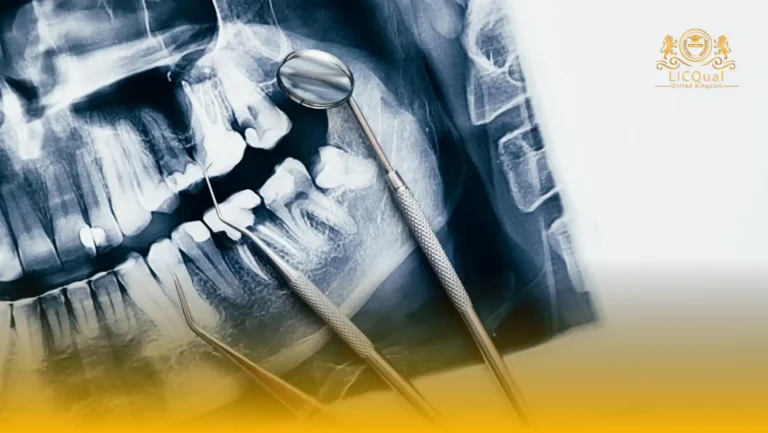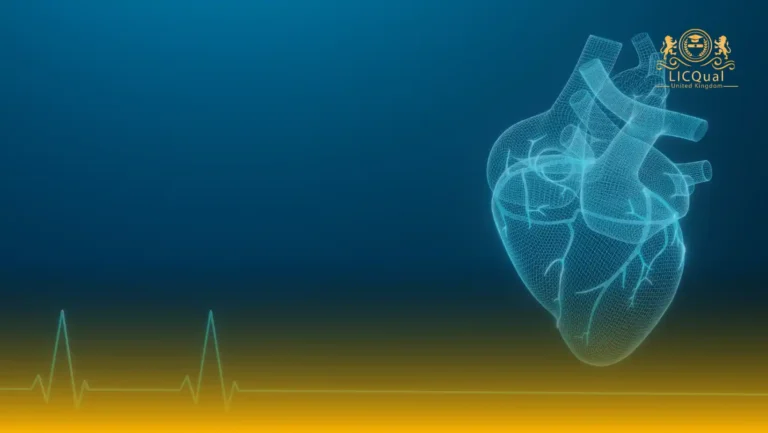The LICQual Level 3 Diploma in Obstetrics and Gynecology (Dip Obstetrics and Gynecology) is a specialized qualification designed for healthcare professionals seeking to advance their knowledge and expertise in women’s health, pregnancy care, and reproductive medicine. This diploma is not intended for beginners; it is aimed at learners who already possess foundational knowledge or experience in healthcare, midwifery, nursing, or related fields. By completing this course, learners can enhance their career prospects, deepen their clinical understanding, and strengthen their Continuing Professional Development (CPD).
This comprehensive qualification covers key areas in obstetrics and gynaecology, including maternal health, antenatal and postnatal care, reproductive system disorders, gynaecological procedures, and ethical and legal considerations in women’s health. Learners will gain both theoretical knowledge and practical skills, equipping them to provide safe, evidence-based care and contribute effectively to multidisciplinary healthcare teams.
LICQual ensures that all centres delivering this diploma maintain the highest standards of training. Centres are required to employ competent and qualified staff and provide all necessary resources, materials, and facilities to support effective learning and maximise learner success. This ensures a professional, structured, and high-quality educational experience that aligns with international standards.
By undertaking the LICQual Level 3 Diploma in Obstetrics and Gynecology, learners position themselves as skilled and knowledgeable professionals, ready to make a meaningful impact in women’s health services. This qualification is ideal for those committed to excellence in obstetric and gynaecological practice, continuous learning, and professional growth within the healthcare sector.
Course Overview
Qualification Title
LICQual Level 3 Diploma in Obstetrics and Gynecology (Dip Obstetrics and Gynecology)
Total Units
6
Total Credits
60
GLH
240
Qualification #
LICQ2200875
Qualification Specification
To enroll in the LICQual Level 3 Diploma in Obstetrics and Gynecology (Dip Obstetrics and Gynecology) , applicants must meet the following criteria:
|
Qualification# |
Unit Title |
Credits |
GLH |
|---|---|---|---|
|
LICQ2200875-1 |
Fundamentals of Obstetrics and Genecology |
10 |
40 |
|
LICQ2200875-2 |
Female Reproductive Anatomy and Physiology |
10 |
40 |
|
LICQ2200875-3 |
Antenatal, Intrapartum, and Postnatal Care |
10 |
40 |
|
LICQ2200875-4 |
Gynaecological Disorders and Clinical Management |
10 |
40 |
|
LICQ2200875-5 |
Ethical, Legal, and Professional Practice in Obstetrics and Genecology |
10 |
40 |
|
LICQ2200875-6 |
Contemporary Issues and Continuing Professional Development in Women’s Health |
10 |
40 |
By the end of this course, learners will be able to:
Unit 1: Fundamentals of Obstetrics and Gynaecology
By the end of this unit, learners will be able to:
- Explain the scope and role of obstetrics and gynaecology in healthcare.
- Define key concepts in reproductive health, maternal health, and women’s wellness.
- Describe the stages of antenatal, intrapartum, and postnatal care.
- Identify common gynaecological conditions and disorders.
- Understand the roles and responsibilities of obstetrics and gynaecology professionals within a multidisciplinary team.
Unit 2: Female Reproductive Anatomy and Physiology
By the end of this unit, learners will be able to:
- Demonstrate knowledge of female reproductive anatomy and physiology.
- Explain hormonal regulation and the menstrual cycle.
- Understand fertility, conception, and reproductive health considerations.
- Recognise anatomical variations and their implications for clinical practice.
- Apply anatomical and physiological knowledge to support diagnostic and treatment procedures.
Unit 3: Antenatal, Intrapartum, and Postnatal Care
By the end of this unit, learners will be able to:
- Implement principles of prenatal care to monitor maternal and foetal health.
- Identify and manage common pregnancy complications and risks.
- Apply labour and delivery management techniques safely and effectively.
- Provide postnatal care for maternal recovery and newborn health.
- Demonstrate patient-centred care and effective collaboration with healthcare teams.
Unit 4: Gynaecological Disorders and Clinical Management
By the end of this unit, learners will be able to:
- Recognise and assess common gynaecological conditions.
- Apply appropriate diagnostic approaches and clinical investigations.
- Develop and implement treatment and management plans, including medical and surgical interventions.
- Apply ethical principles and patient-centred care in gynaecology.
- Promote health education, prevention, and patient engagement in reproductive health.
Unit 5: Ethical, Legal, and Professional Practice in Obstetrics and Gynaecology
By the end of this unit, learners will be able to:
- Apply ethical principles in obstetric and gynaecological care.
- Understand legal considerations, patient rights, and informed consent processes.
- Demonstrate adherence to professional standards, accountability, and clinical governance.
- Communicate sensitively and effectively with patients from diverse cultural backgrounds.
- Manage complex clinical and ethical situations in practice responsibly.
Unit 6: Contemporary Issues and Continuing Professional Development in Women’s Health
By the end of this unit, learners will be able to:
- Evaluate emerging trends, research, and innovations in obstetrics and gynaecology.
- Apply evidence-based practices to enhance patient care.
- Demonstrate reflective practice and engage in lifelong learning strategies.
- Plan for career progression and leadership opportunities within women’s health.
- Maintain Continuing Professional Development (CPD) to ensure professional growth and competence.
The LICQual Level 3 Diploma in Obstetrics and Gynecology (Dip Obstetrics and Gynecology) is designed for healthcare professionals, clinicians, and aspiring specialists who want to gain accredited expertise in women’s health, pregnancy care, and reproductive medicine. This obstetrics and gynecology diploma for healthcare professionals is ideal for doctors, nurses, midwives, researchers, and students who aim to strengthen their knowledge, improve patient outcomes, and advance their careers in one of the most vital areas of modern medicine.
1. Medical Doctors and Physicians
- Expand your clinical expertise with accredited OBGYN training.
- Learn evidence-based approaches to maternal and reproductive health.
- Gain skills in managing pregnancy, labor, and gynecological conditions.
- Strengthen your professional profile with a recognized qualification.
- Stay competitive in the evolving field of women’s healthcare.
2. Nurses and Allied Health Professionals
- Acquire practical skills in obstetric and gynecological care.
- Support physicians in managing pregnancy and reproductive health.
- Improve career prospects with a CPD-approved qualification.
- Gain confidence in patient communication and counseling.
- Build expertise in a high-demand healthcare specialty.
3. Midwives and Maternal Health Specialists
- Learn advanced techniques in antenatal and postnatal care.
- Gain expertise in labor and delivery management.
- Strengthen your practice with evidence-based maternal health knowledge.
- Improve patient outcomes through holistic maternity care.
- Position yourself as a trusted professional in women’s health.
4. Public Health and Healthcare Administrators
- Understand the global impact of maternal and reproductive health.
- Gain insights into prevention strategies and healthcare policies.
- Support community-based women’s health awareness programs.
- Strengthen institutional credibility with accredited staff.
- Promote innovation in obstetric and gynecological healthcare delivery.
5. Biomedical and Clinical Researchers
- Deepen your understanding of reproductive medicine and women’s health.
- Contribute to research in obstetrics, gynecology, and maternal care.
- Gain a recognized qualification to support academic publications.
- Collaborate with healthcare institutions on clinical studies.
- Advance your career in medical research and innovation.
6. Students and Aspiring Healthcare Professionals
- Build a strong foundation in obstetrics and gynecology early in your career.
- Gain a competitive edge when applying for advanced programs.
- Learn from expert-led modules designed for beginners and professionals.
- Acquire knowledge that bridges theory with clinical practice.
- Position yourself for future specialization in OBGYN.
7. International Healthcare Practitioners
- Access a globally recognized qualification in obstetrics and gynecology.
- Learn flexible, online modules designed for international learners.
- Gain skills applicable across diverse healthcare systems.
- Enhance employability in global healthcare markets.
- Join a worldwide community of OBGYN specialists.
To ensure high-quality delivery and learner success, centres offering the LICQual Level 3 Diploma in Obstetrics and Gynecology must meet the following requirements:
- Qualified and Experienced Staff: Centres must employ trainers and assessors who are fully qualified, competent, and experienced in obstetrics, gynaecology, midwifery, or related healthcare fields. Staff should have expertise in both theoretical knowledge and practical application.
- Comprehensive Learning Resources: Centres must provide all essential materials, including textbooks, clinical guidelines, case studies, and access to practical training facilities to support effective learning.
- Adequate Facilities: Training environments should be safe, well-equipped, and suitable for both theoretical instruction and practical exercises relevant to obstetrics and gynaecology.
- Assessment and Support Systems: Centres must implement clear assessment procedures aligned with international standards and provide continuous learner support, guidance, and feedback throughout the course.
- Compliance with Legal and Professional Standards: Centres must adhere to local health and safety regulations, patient confidentiality requirements, and professional standards for healthcare training.
- Commitment to Quality and CPD: Centres must demonstrate a dedication to continuous improvement by ensuring staff participate in ongoing professional development and maintain current knowledge in obstetrics and gynaecology.
By meeting these requirements, centres ensure learners receive a high-quality, professional learning experience, are fully supported in achieving their qualification, and are prepared to excel in women’s health, maternity care, and reproductive healthcare services.
Assessment and Verification
All units within this qualification are subject to internal assessment by the approved centre and external verification by LICQual. The qualification follows a criterion-referenced assessment approach, ensuring that learners meet all specified learning outcomes.
To achieve a ‘Pass’ in any unit, learners must provide valid, sufficient, and authentic evidence demonstrating their attainment of all learning outcomes and compliance with the prescribed assessment criteria. The Assessor is responsible for evaluating the evidence and determining whether the learner has successfully met the required standards.
Assessors must maintain a clear and comprehensive audit trail, documenting the basis for their assessment decisions to ensure transparency, consistency, and compliance with quality assurance requirements.







